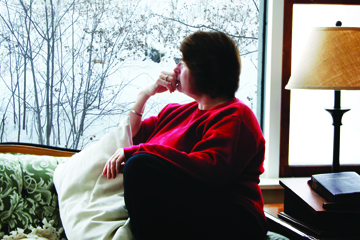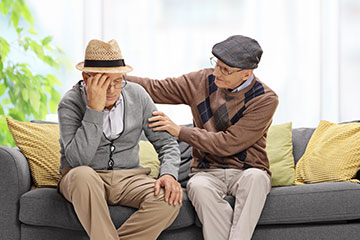In the New Church we have an abundance of beautiful and comforting teachings on life after death. This can be such a blessing to people. It is a blessing to know what happens to us when we die--it can remove many of the fears that we may have. It is also a blessing to know what happens to our loved ones when they die. It is comforting to be able to place them when we can no longer be with them physically. In a small way, it may be analogous to seeing a friend’s or sibling’s apartment after they have moved across the country. We still miss them, but now we can picture their surroundings and it brings a sense of relief.
On the other side of the coin, we can also be quite naive about death and what someone may be going through. We like to say things like, "Everything will be okay. He’s in a better place.” Or, "Don’t cry, she is in heaven now,” or “I know how you must feel.” (No we don’t, unless we have been there).
We can have the opinion that if someone believed in what the Writings taught about Heaven that they would have no sorrow over the passing of a loved one. This is not the case--except maybe in cases of acute denial, but even then the sorrow will manifest itself in some other way in the future. The fact is that when someone loses a friend, spouse, child, parent, grandparent, brother, sister or whomever, their whole world can become quite insane. They may be wondering whether they have gone crazy because they cannot seem to think of anything else and can’t stop crying about it. Or they may wonder if they need to go to the hospital because they are feeling physically very sick. Everyone’s experience is different, and yet everyone’s experience is similar in that they feel a great deal of pain over an undetermined period of time. Many people believe or were told that they will "get over it” in a year or in so many months. But what researchers and experience has shown recently is that people don’t get over it, it is always a part of their life and experience. They will eventually start to resume the activities of their "normal” life, like shopping, cleaning, going to work, and socializing--but that doesn’t mean that their grief has been resolved or that they are over it.
So what are some of the things that we can do to help somebody after the death of a loved one?
One of the first things we can do is not assume we know how they feel or try to discount the grief they are experiencing.
Here are six helping strategies that I learned in a class on Grief & Loss that we can use to help those who have lost a loved one.
1. Give Permission to Grieve
Tell the person that you are sorry about their loss. Or let them know that they have a right to be in pain. It may be of a comfort to know that they are not insane but that what they are experiencing is quite normal. I was struck by a story of a minister who came to someone’s house after they lost a loved one and instead of saying the normal, "He’s in a better place and in better hands,” he said, "It hurts like hell doesn’t it.” This was exactly what the man was thinking and feeling. He wasn’t feeling that it was for the best that he had lost his son or that everything was fine--it wasn’t.
2. Avoid the Conspiracy of Silence
We have a tendency to not want to bring up discussion about the deceased because it may cause pain. But we need to know that the person who has lost a loved one most likely want’s to talk about it with someone--maybe even needs to talk about it. We go to the person’s house and neither of us brings it up because we don’t know if the other person can handle it so it becomes this huge barrier. You may just say, “I am sorry about your husband. Do you want to talk about this?” It is important to invite them to talk about it, never force them.
With children we need to remember that they grieve also. Just because they may not manifest it the same way that we do doesn’t mean that they aren’t sad. Talk with them about it. They may need to ask a lot of questions over a long period of time because they can only understand so much at one time about such an event. And don’t tell them something that isn’t true, such as, "Mommy went on a long trip,” or “Grandma is sleeping for a long time.” These two things are both reversible and so they may expect them to return. Or they may be afraid to go to sleep for fear they will sleep so long or be taken away.
3. Recognize Anniversary Dates
On occasions like the anniversary of someone’s death or around festive times like Christmas try to be especially supportive. At these times especially strong emotions may bubble back to the surface. Organizing a get together of friends can be useful. Inactivity is not useful to someone who is grieving. Try to phone, send a card, or visit someone at these times, or make sure they have people around.
4. Encourage Externalization of Grief
Let someone know that it is okay to cry (actually, big boys do cry). But also realize that crying is not the only way that people grieve. The individual may not be a crier. Maybe they need to have a punching bag installed in their basement because some people need a physical energy release of some other kind. Try to encourage that if it is their way. People may need to write down their ideas, just talk with you, or do a ritual of some sort that has special meaning to them.
5. Be Available - Listen
It is helpful to be there to listen. Not just being a warm body, but being there emotionally for the person. If you also are sad over the loss of this person cry with them. Don’t assume that someone wants you to hold them if they are crying. They may not want to be touched. It is best if we can ask something like, "How can I be supportive? Would you like me to hold you?”
6. Assist in Practical and Concrete Ways - Be Specific in Offers to Help
We are all probably most familiar with the Mourner’s Buffet. That is, when someone dies many people will bring over a dish of food for the family. We may scoff at this but actually it is one of the most important things we can do to help. People who are grieving will often not have the energy to cook, clean, shop, or even eat. Grieving is a very draining process and people need to keep up their strength. So helping in very tangible ways like this are extremely useful. We may not really know what to say at these times, but helping this way says a lot.
Someone who is grieving may not know what they need so when asking if you can help try to be specific. For example, "Can I take care of the children for the afternoon for you?” “Could I make dinner for you tonight?” “Can I go shopping for you?” “Can I clean up the kitchen and bathrooms for you or do the laundry?” These are extremely helpful things that we may not always think of, but they will not go unappreciated.
The death of a loved one is a very difficult time. We have the opportunity to be of use in very tangible ways at a time like this. Just because someone doesn’t ask for help doesn’t mean they don’t need it.
As a church we have beautiful teachings to support people at this difficult time. But we also have wonderful people who can support one another in meaningful and helpful ways. I guess I would conclude by saying the most important thing is to be available to each other at these times emotionally, physically, and practically.






